
– 21-03-2021 –
Gospel reading: John 12:20-3o
vs.20 Among those who went up to worship at the festival were some Greeks.
vs.21 These approached Philip, who came from Bethsaida in Galilee, and put this request to him, “Sir, we would like to see Jesus.”
vs.22 Philip went to tell Andrew, and Andrew and Philip together went to tell Jesus.
vs.23 Jesus replied to them: “Now the hour has come for the Son of Man to be glorified.
vs.24 I tell you, most solemnly, unless a wheat grain falls on the ground and dies, it remains only a single grain; but if it dies, it yields a rich harvest.
vs.25 Anyone who loves his life loses it; anyone who hates his life in this world will keep it for the eternal life.
vs.26 If a man serves me, he must follow me, wherever I am, my servant will be there too. If anyone serves me, my Father will honour him.
vs.27 Now my soul is troubled. What shall I say: Father save me from this hour? But it was for this very reason that I have come to this hour. 
vs.28 Father, glorify your name!”
A voice came from heaven, “I have glorified it, and I will glorify it again.”
vs.29 People standing by, who heard this, said it was a clap of thunder; others said, “It was an angel speaking to him.”
vs.30 Jesus answered, “It was not for my sake that this voice came, but for yours. Now sentence is being passed on this world;
now the prince of this world is to be overthrown. And when I am lifted up from the earth, I shall draw all to myself.” By these words he indicated the kind of death he would die.
****************************************************************
We have four commentators available from whom you may wish to choose . Scroll down to the name of the commentator.
Michel DeVerteuil : A Trinidadian Holy Ghost Father, late director of the Centre of Biblical renewal .
Thomas O’Loughlin: Professor of Historical Theology University of Nottingham NG7 2RD
Sean Goan: Studied scripture in Rome, Jerusalem and Chicago and teaches at Blackrock College and works with Le Chéile
Donal Neary SJ: Editor of The Sacred Heart Messenger and National Director of The Apostlship of Prayer.
****************************************
Michel DeVerteuil
Lectio Divina with the Sunday Gospels
www.columba.ie
Textual comments
– Verses 20 to 22 show us some Greeks “wanting to see Jesus”. It is of course interesting in that they made their way to Jesus through a disciple who had a Greek name. He was Andrew who was from Bethsaida and had come with Jesus all the way from Galilee.
This quickly became one of the main principles of evangelisation – people must be approached by those like them. The principle was followed in the Acts of the Apostles and the letters of St Paul. St Paul himself was an exception in that he was a Jew, but his name Paul fitted more specially the gospel of the Greeks.
– Verse 23 shows us that Jesus is fully conscious that at this stage of his life “his hour has come“. He knows he is in a crisis moment. This is something that happens from time to time in the life of every person. It usually happens to us just once or twice; it is a time when we feel at the bottom of the pile.
Anything can happen to us; we have all gone through this and must measure our responses by what we know was in the mind of Jesus as he went through it.
– Verse 24 is a very brief parable.
We learn first to feel the pain of “it falls on the ground“. We can well imagine what this involves. The seed has fallen on the ground and it is just there. It waits to see if it will lie there unused and helpless; here and now it will be open to every eventuality.
Then we enter into the second moment of “it dies.” The “dying” reminds us that we are actually in a position of being closed to new life. We are not sure whether we will lie there or whether this death will lead to new life.
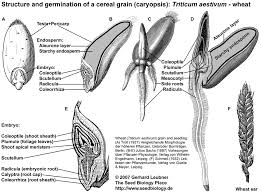 This “hour” has two possible outcomes:
This “hour” has two possible outcomes:
1. We can remain only a single grain of wheat, safe in ourselves but also isolated with no possibility of bringing out further harvest. This may well describe how we are at this particular time.( c/f diagram>)
2.We can yield a rich harvest. We are then sure of bringing forth fruit in others. We allow our passing (dread though it be to us) to bring new life to others. Their life will be more full because of what we have done for them.
– Verse 25 is the same teaching but the contrast is now between
* clinging to the present and losing what one has;
* on the contrary, risking the present with the effect of saving the future.
Identify with both possibilities. One is sad but tragic, the other is full of great glory for ourselves and for others.
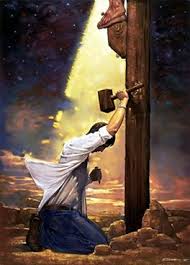 – Verse 26 makes the teaching personal.
– Verse 26 makes the teaching personal.
“If a man serves me, he must follow me, wherever I am, my servant will be there too.” Jesus himself has made this journey of faith. He allowed himself to fall on the ground in uncertainty and then to die. He was totally unsure of what would happen afterwards, whether he would bring life to others or not, but he went ahead and accepted it.
“If anyone serves me, my Father will honour him“. Jesus broadens the picture. His “Father” here includes all those who give this person the honour he or she deserve.
– As a follow up, verse 27 invites us to accompany Jesus on his journey. This is John’s account of what the Synoptic gospels relate as Jesus’ well known “agony in the garden”. His first petition is that the Father would change his mind: “Father save me from this hour; my soul is sorrowful even unto death”. This then becomes the second petition, “nevertheless let it be as you, not I would have it”. It finally ends with “let your will be done”.
From Jesus’ words, we can then gauge the movement from Jesus’ first petition, “save me from this hour“, to the more glorious one of “Father, glorify your name“. This is the first petition of the Our Father and in biblical language means the same as the second and third petitions – “your kingdom come” and “your will be done”.
– In verses 28 to 30 Jesus says, quite simply, that the voice from heaven, “I have glorified it and will glorify it again” arose not for the sake of Jesus himself but in order to please the onlookers – “It was not for my sake but for yours.” The onlookers will then be able to see for themselves that everything that happened to Jesus came from their own experience of suffering.
– Verses 31 and 32 express the attitude of Jesus as he faces his hour, “Now sentence has been passed on this world and the prince of this world is to be overthrown”. In Jesus’ own self-effacing he shows no self-pity and no bitterness. He is sad but totally confident that God’s work will be done through him, “when I am lifted from the earth I shall draw all people to myself”.
Prayer Reflection
Lord, we remember today all those who know that the hour has come for them:
* couples about to commit themselves to each other for life;
* people, secure in their jobs, who know you are calling them to move into some new field;
* parents who must now let go of their children;
* friends who have decided to break off a relationship which is harmful to them;
* families facing a drop in their standard of living.
Help them to feel Jesus making the journey with them.
Remind them of his pain and how he had to tell himself that unless the grain of wheat falls on the ground and dies it remains only a single grain, but if it dies it yields a rich harvest.
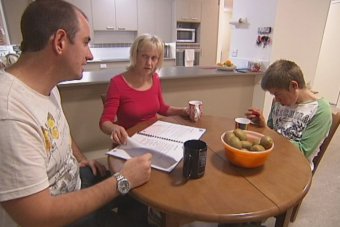
Worried families
Lord, we thank you that the Church in many countries
has taken the risk of falling on the ground and dying:
* has lost the support of the powerful and the wealthy
by embracing the cause of the poor;
* has preached ideals of chastity in societies that are permissive;
* has allowed little people to follow their own pace and to make mistakes.
And now it is yielding a rich harvest.
Lord, as we look back on our lives we remember how we did not take the risks we should have taken and so have remained a single grain instead of yielding a rich harvest.
Help us to live with our mistakes, to give up our regrets, letting them fall on the ground and die, trusting that there is another kind of harvest that we can yield.
Lord, the first priority of the wealthy nations of the world today
is to preserve their wealth.
We thank you for the prophetic voices that have been speaking out,
reminding these nations of the message of Jesus,
that if they remain turned in on their worldly possessions they will lose them all,
whereas if they take the risk of sharing with others they will experience peace and security for the future.
Lord, we who are in positions of authority over others
– parents, teachers, priests, community leaders – we like to prescribe things for others,
handing on abstract teachings on right and wrong.
Remind us that we can only share our own journeys, inviting others to follow us so that where we are, they may one day be too, and leaving it up to you to honour them.
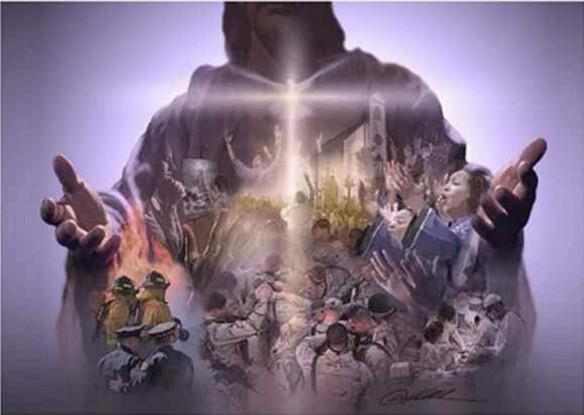 Lord, we think today of those whose souls are troubled
Lord, we think today of those whose souls are troubled
as they meet their hour:
– activists facing imprisonment or even death;
– priests and religious
suddenly confronted with the implications of their vows;
– church leaders as they face up to the frustrations of acting democratically.
We feel for them as in their confusion they ask you,
“What shall I say? Father save me from this hour.”
Give them the faith to see that it was for this very reason
that they have come to this hour,
and to invite you to glorify your name.
********************************************************
Thomas O’Loughlin
Liturgical Resources for the Year of Matthew
www.columba.ie
Introduction to the Celebration
As we approach Holy Week and our celebration of Christ’s mystery, his death and resurrection being our opening to the fullness of life, today we read in the gospel that anyone who loves his life, loses it, any anyone who hates his life in this world will keep it for eternal life. This challenges each of us to recognise just how different a vision of life we must have if we are to serve and follow Jesus Christ.
Homily Notes
1. Follow the same strategy today as last Sunday and ‘go through’ the liturgy of the Easter Vigil.
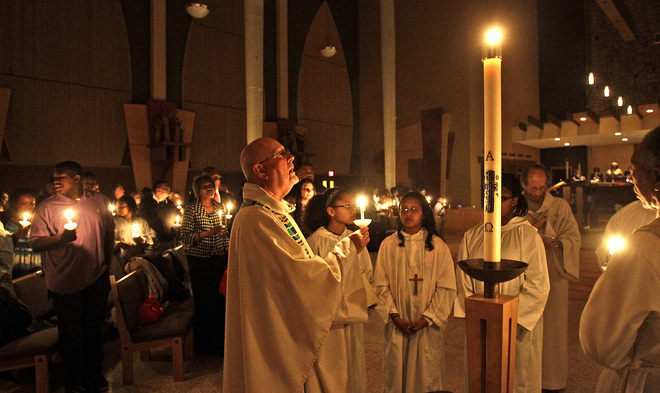 This vigil is the centre of the liturgical year. The fact that it is peripheral to many normally active in the liturgy indicates how little the renewal of theology and liturgy begun in the 1960s has sunk into our consciousness. The Missal describes it as ‘the mother of all vigils’ (n 20, p. 202) and sees the readings as its core: ‘it must always be borne in mind that the reading of the word of God is the fundamental element of the Easter Vigil’ (n 21). In practice, it is almost the exact reverse. The readings get squeezed (almost squeezed out) between the opening drama of the paschal fire, and the excitement of the baptism liturgy.
This vigil is the centre of the liturgical year. The fact that it is peripheral to many normally active in the liturgy indicates how little the renewal of theology and liturgy begun in the 1960s has sunk into our consciousness. The Missal describes it as ‘the mother of all vigils’ (n 20, p. 202) and sees the readings as its core: ‘it must always be borne in mind that the reading of the word of God is the fundamental element of the Easter Vigil’ (n 21). In practice, it is almost the exact reverse. The readings get squeezed (almost squeezed out) between the opening drama of the paschal fire, and the excitement of the baptism liturgy.
The assumption of the liturgy is that all nine readings are used: they are not offered as options from which to make a selection. An individual community can reduce the number’ for special reasons’ (Lectionary, vol 1, p. 399) to five; and ‘more serious reasons’ are needed if only four are used (Missal, n 21). However, if the reason for dropping any reading is the time factor, then the question must be asked as to why bother with the vigil at all? If any of the readings are dropped, then the purpose of the whole sequence becomes invisible: the idea is that there is a long sequence of texts and that we ‘listen … to the word of God, recalling how he saved his people throughout history, and in the fullness of time sent his Son to be our Redeemer’ (Missal). The notion of a long sequence of steps, ‘again and again you offered covenant to us,’ cannot be conveyed with just two or three readings as that number is simply not large enough to give a sense of God’s continual steadfast love.
Given that people have come out especially and on this night are more closely attuned to the liturgy than usual, it is worth taking the extra time (it takes 10-15 minutes max.) to read all nine passages. Doing this well, with a variety of readers, and styles of music for the psalms, can let the vigil’s message sink home better that any homily.
Unlike Christmas Midnight Mass, after almost fifty years this vigil has failed to capture the Christian imagination. Indeed, the introduction of the Saturday vigil Mass has often meant that this night has just become an ordinary vigil Mass with ‘bits’ tacked on. The liturgy tonight uses four great signs in succession (fire, word, water, and food) to convey the message that we have been remade as a people through the resurrection.
Fire breaks out in darkness — so it is useless to begin before nightfall — and becomes ‘our light our joy.’ The great candle is the beacon of the risen Christ.
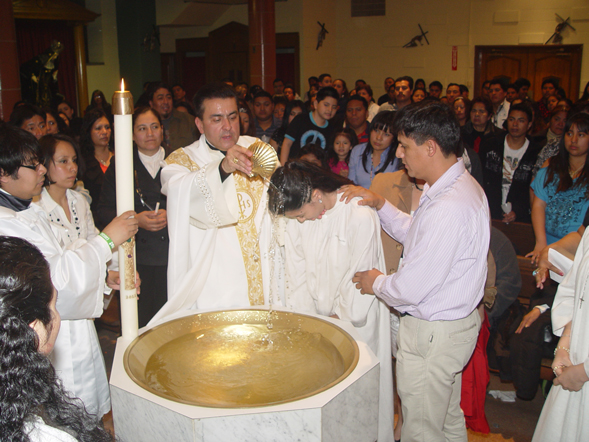 ‘Unless one is born of water and the Spirit, he cannot enter the kingdom of God’ (Jn 3:5); we rise in Christ through being buried with him in baptism (Col 2:12) so water and baptisms are central to this night. This is the ideal time for the community to welcome new members and, in doing so, to remember that we are there because we are the baptised.
‘Unless one is born of water and the Spirit, he cannot enter the kingdom of God’ (Jn 3:5); we rise in Christ through being buried with him in baptism (Col 2:12) so water and baptisms are central to this night. This is the ideal time for the community to welcome new members and, in doing so, to remember that we are there because we are the baptised.
Lastly, there is the Lord’s banquet. We encounter the Lord in food and we thank the Father through a food ritual. Christ our Passover has been sacrificed and, therefore, we now celebrate the feast (cf 1 Cor 5:7f) and ‘the cup of blessing which we bless is a participation in the blood of Christ, the bread we break is a participation in the body of Christ’ — we are made into a new people through this sharing (1 Cor 10:16f).
Giving real ritual significance — the opposite of tokenism — to the various parts of this liturgy may be the key to establishing this as ‘the night’ with all its associations, as listed in the Exultet.
***************************************************
Sean Goan
Let the Reader Understand
www.columba.ie
Gospel notes: John 12:20-30
The gospel of John is divided into two parts and with this text we approach the end of part one, sometimes known as the Book of Signs. Chapter 12 forms a link between the end of Jesus’ public life and the beginning of his passion. The scene is Jerusalem which is full of pilgrims arriving for the feast of Passover. Many of these are Greek-speaking Jews arriving from all around the Roman empire and their request to see Jesus is a  reminder that ‘seeing’ in the fourth gospel is another way of speaking of ‘believing in’. On the cross Jesus is drawing all people to himself and inviting a faith response to the love of God that he has manifested. His death is like a seed of grain falling into the ground where it perishes but out of it comes growth and a rich harvest. This is the way of love and all who would follow Jesus must walk this path. By so doing they participate in God’s ultimate victory over evil.
reminder that ‘seeing’ in the fourth gospel is another way of speaking of ‘believing in’. On the cross Jesus is drawing all people to himself and inviting a faith response to the love of God that he has manifested. His death is like a seed of grain falling into the ground where it perishes but out of it comes growth and a rich harvest. This is the way of love and all who would follow Jesus must walk this path. By so doing they participate in God’s ultimate victory over evil.
Reflection
Jeremiah looked forward to a day when we would all know God, ‘the least no less than the greatest’. Some six hundred years later what Jeremiah was speaking about unfolded in the life, death and resurrection of Jesus. With the pilgrims in the gospel we are invited to say: ‘We wish to see Jesus’ and to recognise that in the events of Holy Week our request is granted. Now once again Jesus is revealed to us, not as a distant figure from the past who suffered for doing good, but as the living one who even now is calling us to new life. In him we are being offered nothing less than intimate friendship with God. Let us pray with Jesus, ‘aloud and in silent tears’ that we will be humble enough to accept this transforming gift.
**************************************
Donal Neary SJ
Gospel Reflections
www.messenger.ie/bookshop/
Approaches to suffering
I knew a man who fought cancer to the end. And he took to every type of possible healing. We all had been told it wouldn’t work. I know another who just opened himself to it all and wouldn’t even take chemo. These are different approaches to suffering. One fought it and the other accepted. I admired both of them.
 Many people go into hospital wondering about their illness, and that death might be close. That’s part of life. As for Jesus, it’s a fearful time, confusing and sometimes draws us into more faith. We can transform our pain into suffering, and find some great graces in it. There is the challenge to find new life in it. Pain becomes suffering. Jesus doesn’t want the chalice of the garden, but he allows it become fully part of him so that his inner strength is big! It doesn’t mean a simplistic approach. But it means an acceptance of darkness in life.
Many people go into hospital wondering about their illness, and that death might be close. That’s part of life. As for Jesus, it’s a fearful time, confusing and sometimes draws us into more faith. We can transform our pain into suffering, and find some great graces in it. There is the challenge to find new life in it. Pain becomes suffering. Jesus doesn’t want the chalice of the garden, but he allows it become fully part of him so that his inner strength is big! It doesn’t mean a simplistic approach. But it means an acceptance of darkness in life.
Jesus found in his passion that God the Father is near. This can be our way, and we can find that through helping each other. We can help people at times of suffering – listening, being present. We find this in our hearts, not in books – that we can grow through suffering and we realise on a bad day that peace invades the soul, or that there is a bright light in the darkness.
In any suffering in our lives, when we think of God, or say his name, or question him, maybe we can just imagine a light around us,.
Saying nothing, just being open to the light.
Lord, by your cross and resurrection, you have set us free,
you are the Saviour of the world.
***********************************